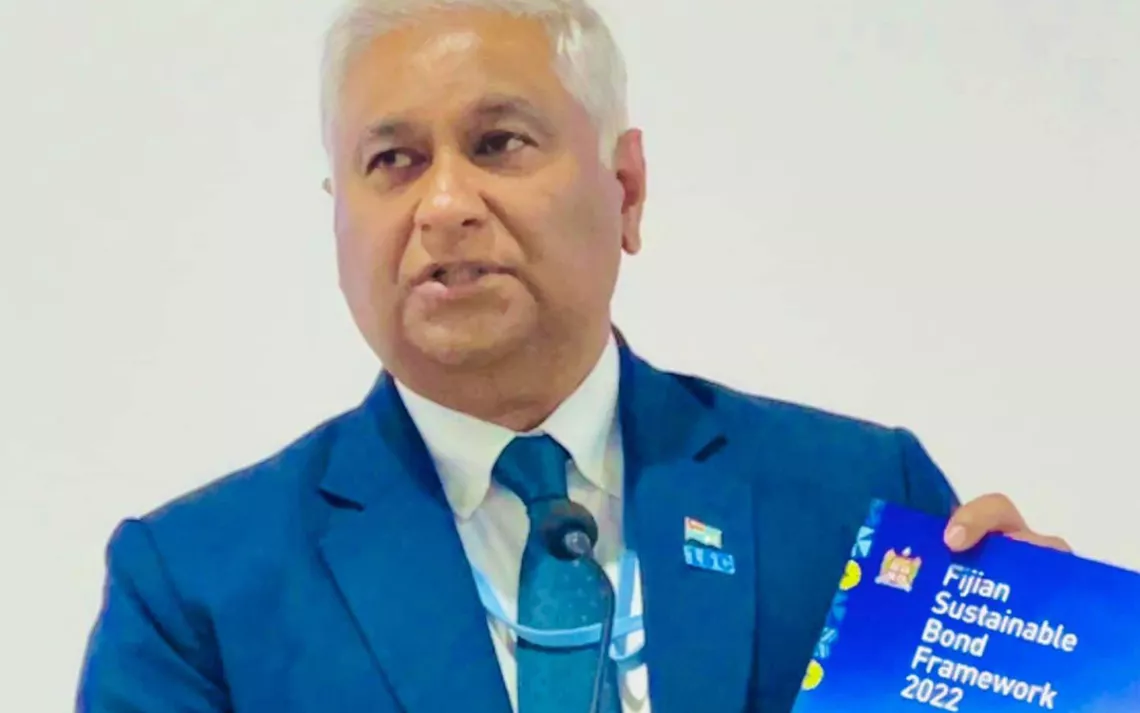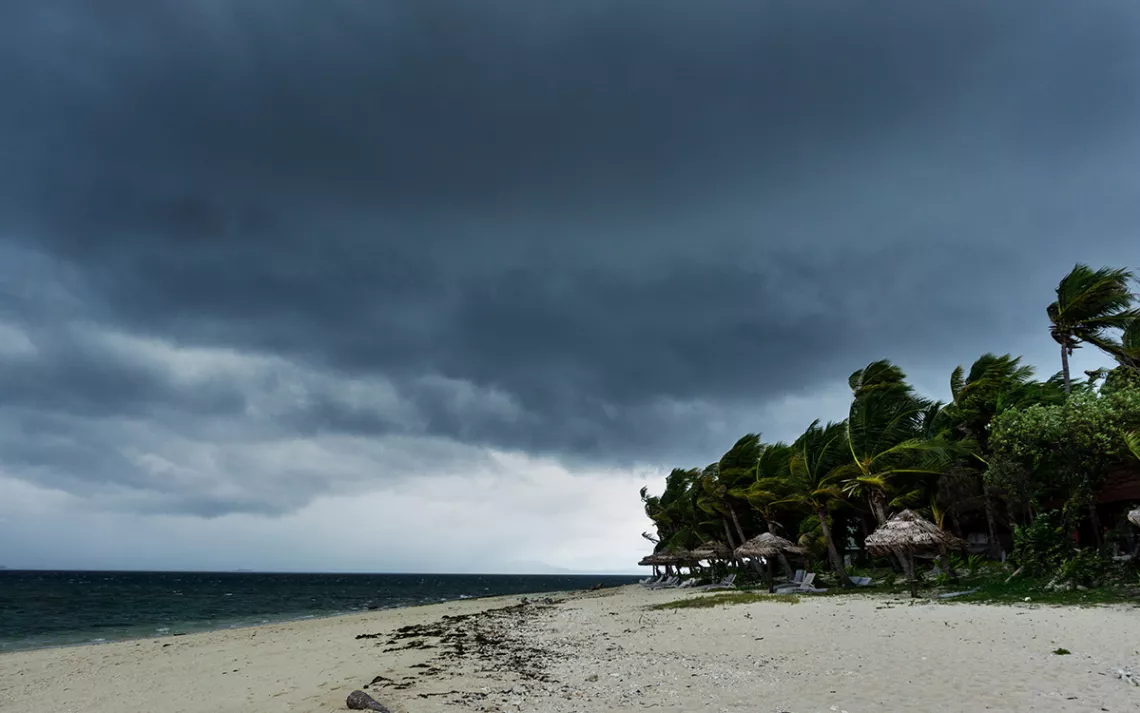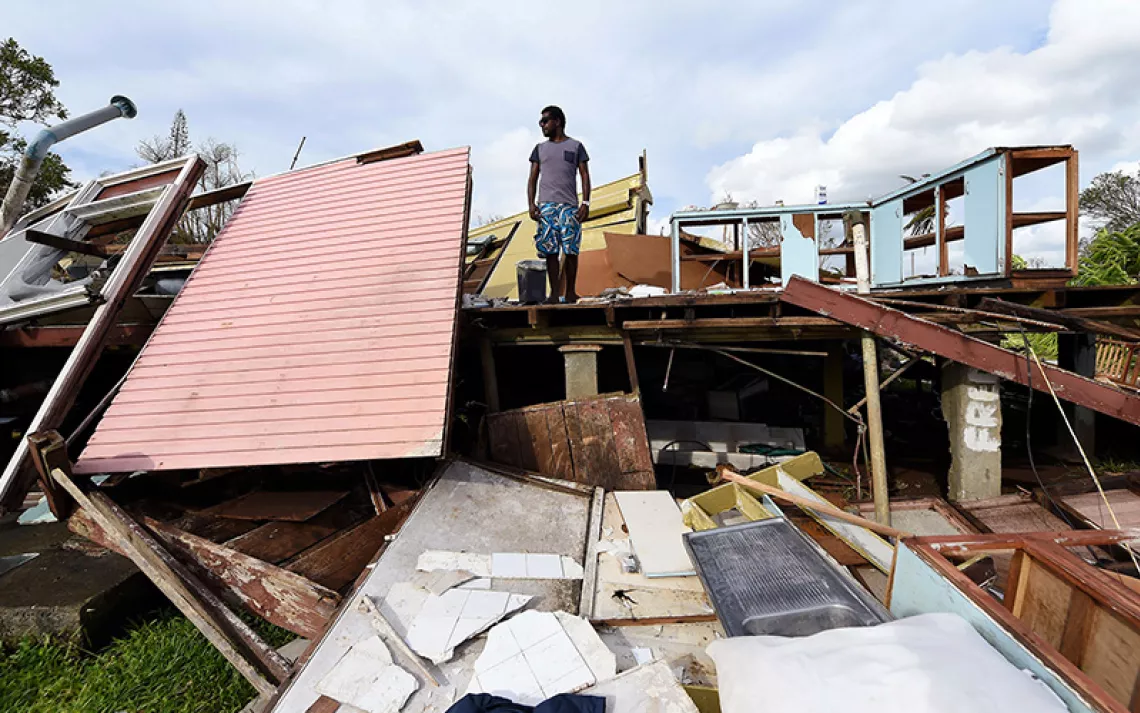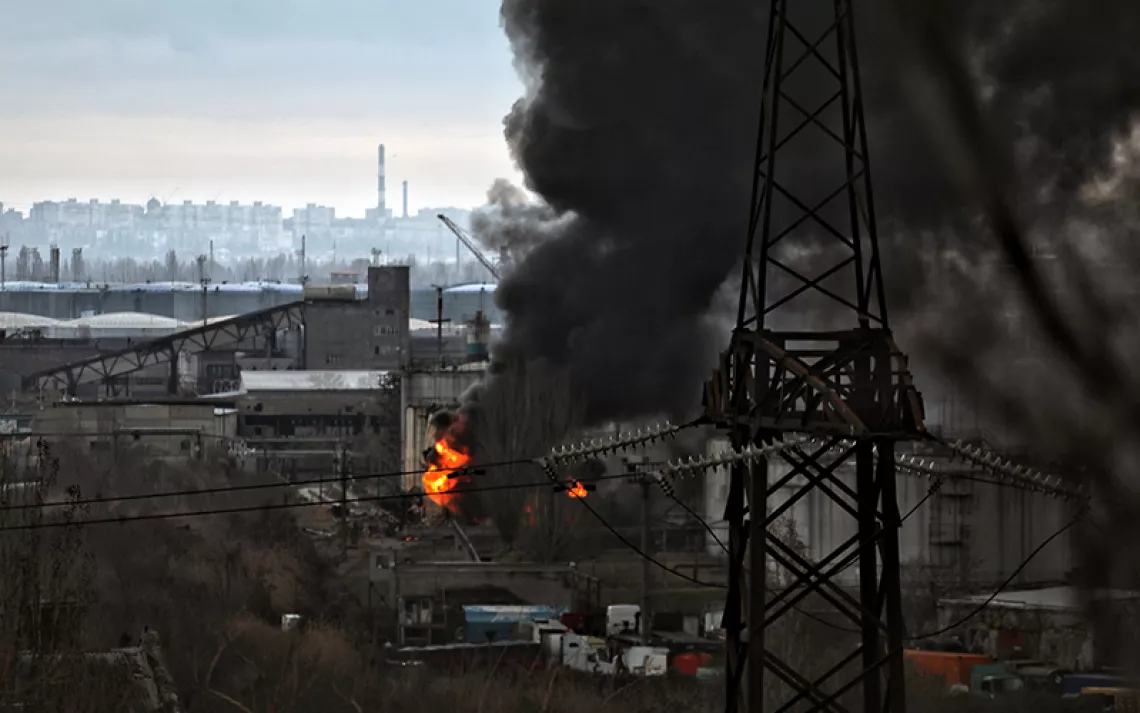The Global Climate Breakdown: What the Island States Want From the Climate Talks
A conversation with Fiji’s UN ambassador

Fiji ambassador to the United Nations Dr. Satyendra Prasad. | Handout photo courtesy Satyendra Prasad
As the United Nations–sponsored climate change negotiations in Sharm el-Sheikh, Egypt, enter their second week, it is easy for those involved in the COP27 negotiations to get lost in the minutiae of the articles and clauses under debate.
For Ambassador Satyendra Prasad, the permanent representative of Fiji to the United Nations, this is a distraction from what is truly at stake—the heartrending human consequences of failing to address climate change before it is too late. Prasad believes that people in every country will suffer deeply from climate change, and the way forward is for world leaders to recognize their shared global interests. While Fiji faces overwhelming climate challenges, he is surprisingly optimistic that climate catastrophe can be averted.
I spoke with Prasad in the midst of the climate summit to hear about what Fiji and other vulnerable countries need in order to adapt to climate change, the losses and damages vulnerable nations are already suffering, and his hopes for a successful outcome. Our conversation has been edited for clarity and brevity.
Steve Herz: I'm hearing a new word this year—polycrisis. It refers to the broad range of traumas that the world is now enduring. Not only the climate crisis, but also COVID and its economic and social impacts, the Ukraine war and the energy security crisis, increased food insecurity, a growing debt crisis. The idea is that all these crises interact and are exacerbating each other. How is this polycrisis being felt in the small island nations like Fiji?
Ambassador Prasad: You're absolutely right—the climate crisis is interlocking and interlinked. The series of crises is not very different from how folks across America would be feeling it. You will feel it at the gas pump, you will feel it in your electricity bills, you will feel it in the price of bread, you will feel it in mortgage rates going up—you will feel it in so many ways that are very personal. But in climate-vulnerable nations or small island states such as Fiji, where I'm from, this is felt in much more magnified and enhanced ways. Oil has to travel many thousands of miles before it reaches us. As a consequence, the shipping costs of everything that we import goes up. The fuel crisis that is coming out of the current global context hits us very hard.
Then, at the same time, we have to deal with climate catastrophe after catastrophe. And climate change has not taken a pause because there's a war in Ukraine. Climate change has not taken a pause because inflation is running [high]. It is not dissimilar in the United States. You had [Hurricane Nicole] hitting Florida on Friday. You had the fires in the West and you have drought across the vast swaths of America. The Mississippi River is the lowest it's ever been.
[All of this] is different than if a cyclone or hurricane were to hit Fiji. Its impact on the country and society would be much more significant because its impact would be on the whole of the economy. If you transpose [a North American hurricane] onto Fiji, in the order of 60 to 70 percent of our GDP would be wiped out. That is like in the United States if you wiped out about $10 trillion of your economy and only $7 trillion remains.
And we've had 13 cyclones on that type of scale, where in a previous period we would have seen [that number] over the course of 70 years. So how do we recover? Starting from that base, then the fuel crisis and inflation and the overall impact on food and, and all the disruptions that it causes—it’s very dire for small island states.
The second point we are making to the United States and Canada and the rich nations in the Global North is that every day that you delay action, the price of adaptation becomes even larger. And all the adaptation that is necessary gets beyond reach. For small island states, the window of adaptation has become too short, far too short.
That's the point of urgency that we are making on the adaptation side: Please double the resources and increase the pace at which resources flow to allow us a fighting chance to help preserve the lives and livelihoods of communities. So that's the urgency—this polycrisis is interlocking.
You might say, “Then this country should simply borrow from commercial banks and the IMF and others.” Most of these countries are already over-leveraged. So it's not even sure whether they have options to borrow to undertake the necessary adaptation.
So, the risks are increasing, the impacts are accumulating, the fiscal space is reduced, and the time window for adaptation is closing, all at the same time.
Wonderful summary.
OK, so in that context, what are the Alliance of Small Island States’ priorities for this climate summit? We know that mitigation, adaptation, and loss and damage are all on the agenda. What would you like to see for the outcome in each of those areas?
First of all, remember that in COP27, we’ve moved to a “COP of implementation.” And to implement anything, the most basic building block of that is finance. And so, we will take every opportunity to keep on stating, “Please deliver on the financial commitments that you have made.” That is such a no-brainer. They [the wealthy nations] cannot walk away from this commitment. We're talking about $100 billion [a goal set in Copenhagen in 2009], which is divided among the different countries. The United States’ share is more or less $10 billion. For an economy this large, that is not a big commitment. There is no excuse, no excuse whatsoever.
The second part is, we are urging everyone in the negotiation rooms to please understand what's happening outside and bring that urgency inside. Sometimes in the negotiation rooms, our counterparts from the Global North, and some of our own from the Global South, talk as if the climate crisis is a thing that is going to happen sometime in future, as if these things are theoretical.
And discussion of the profound impacts that are already happening of course raises the question of loss and damage.
You do not want to wake up in anywhere in the Pacific on the day after a cyclone strikes. If you are the president of the country, you will not know where to start. If you have very little fiscal space, the entire infrastructure is gone. You don't know where the resources are to provide water, to put roofs back on, to get kids back into school, to get your hospitals operational again, to rebuild bridges. Where do you begin? And, you know, why should we have to borrow time and again for that type of thing? So that is the urgency.
It's a complicated thing. People think that when your homes and livelihoods are impacted by sea level rise, that it is as simple as asking people to pack up their belongings and building houses slightly further up the hill. It doesn't work like that. When you remove people from their ancestral homes, it is a big deal—a BFD, as they would say. People’s land rights don't travel with them when they are relocated; people's customary rights don't travel with them. And it is not only houses that you have to physically rebuild. You have to build roads, electricity, and water systems before you can relocate a village to another place. You have to provide health centers and schools and all the infrastructure that is necessary for human development. These types of things have taken seven, eight decades to build. So you can't do that overnight. And right now our predicament is that we have to largely do this through our own resources.
It is unjust, of course. It is probably immoral. It's not for me to preach about morality, but by any yardstick it is wrong.
Now, what we are also saying about loss and damage is the urgency. Like adaptation, if you leave it too late the scale will just multiply. Where adaptation is failing, or where you have incomplete adaptation, you are then looking at loss and damage. That's the equation. Beyond successful adaptation lies stability and a possibility for human development and prosperity. Beyond insufficient adaptation lies pure loss and damage, nothing else. We know that many of our partners from the Global North want to do the right thing. And they perhaps need a little bit more political space. They need perhaps more support from their citizens back home. We hope that you see our point that there is a fundamental unfairness in all of this.

Photo by Martin Lauricella/iStock
Currently, there's no dedicated channel for providing the kind of support for loss and damage that is needed. Countries are now beginning to negotiate what that might look. What would you like to see come out of those discussions?
Imagine a three-legged stool: mitigation, adaptation, and loss and damage. The integrity of climate action depends on each part of it intact and strong. If you have only two legs, the stool will be wobbly and shaky. Without doubt, what we need to do by the next COP is conclude the discussions to broadly agree on the parameters of a loss and damage framework.
I'm sure that, in the end, we will have sufficient consensus on something like the Green Climate Fund or Adaptation Fund. We will have grant-based contributions from member states. I hope as well, that given the scope and scale of loss and damage, that we'll also look at different ways of funding. Perhaps some type of tax on fossil fuel companies and other things can also come into play to provide a predictable financing flow that complements what state parties bring to the table.
We will, with our small island family and all member states aim to get a fantastic loss and damage [system] up and operational in the shortest period of time. I keep on saying “shortest period of time,” because if something happens to the remaining villages tomorrow, it will hit our conscience very, very hard.
The point I keep on making is that if, in the negotiation room, people have a sense of, the scale and urgency outside in the real world, that changes the mood. There seems to be often a disconnect. You think we are talking about some theoretical future context—and we are all worse off if large-scale displacements take place.
Fiji is a small country. We are already dealing with internally displaced people. Of the 48 communities that we are relocating, we can fund only seven. And there are millions, tens of millions of people living barely above sea level in countries such as Bangladesh and across Asia. In many parts of Africa, there'll be large-scale displacement of people. It's in the shared global interest that we try to get a handle on a runaway crisis when we have the window of opportunity.
It sounds like you're relatively optimistic that the discussions are moving in the right direction toward a dedicated channel for loss and damage.
We are Fiji—we have no choice but to be optimistic. In our region, many communities will simply lose their homes and livelihoods within this decade. We are right now headed to a 2.7 [Celsius average global temperature rise]. We will then need to contemplate losing whole countries such as Tuvalu and Kiribati. As leaders of our countries in the roles that we find ourselves, we have to hope for the best.
Some people are inclined to talk about loss and damage as reparations or compensation for past harm by the major emitters of carbon pollution. Do you view it that way?
Absolutely not, absolutely not. The climate crisis is a shared problem. We understand the historical emitters contributed disproportionately, and are continuing to disproportionately impact global warming. But we're all destined to go to a hell-like future. As my prime minister [Frank Bainimarama] says, “We are all in the same canoe.” All of us need to paddle across the choppy waters, so we might get out on the other side. Right now, some of us are paddling, and some of us are not paddling. And we have not too much time to steady our canoe.
President Biden went out of his way to come here to the climate talks on his way to the G-20 summit. I'm wondering how you and your colleagues in the vulnerable countries felt about his speech? Did he inject some momentum in these discussions?
Absolutely. First of all, to President Biden and government of America: Welcome back. Welcome back to leadership [on] climate [change] in the world. We felt it was fantastic to have him and America back in a driving seat on climate discussions and it was a very strong and powerful speech that he made from his heart—the strongest and boldest commitment that we have seen are 50 percent reductions [in carbon pollution] from 2005 to 2030. We look forward to working with the American government in moving the climate discussions.
We wish him well, that he's going to the G-20. And we understand that the United States and China met there. And it would be fantastic to see both the US and China cooperating a lot more on the climate crisis. And if, [aside from] the strategic competition, both countries can begin to cooperate and collaborate on the climate crisis, I think the whole world will be in a far better place.
Finally, let’s talk a little about reducing emissions. More and more, a lot of the new mitigation efforts that are coming online are framed around a “just transition.” What do you think about the framing of a just transition for workers and communities as countries decarbonize?
We are absolutely, fully supportive of a just transition. All we are asking is that there should be fairness and there should be pace and speed in the transition. But we also ask you to please also understand our just existence. Fairness demands that just transition and just existence are seen equally and not that one is superior to the other.
About this series:
The Global Climate Breakdown is hosted by Steve Herz, the Sierra Club’s senior international climate policy advisor. At least once a month, Steve talks with experts and changemakers to help explain some of the most important emerging global climate issues.
 The Magazine of The Sierra Club
The Magazine of The Sierra Club



